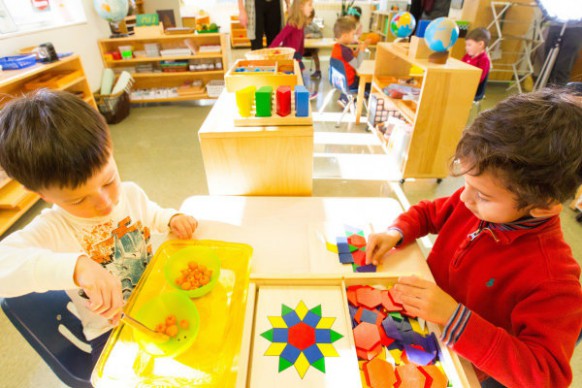Advantages of the Montessori Method
Published by SchoolAdvisor | Dec 22, 2015The Duke and Duchess of Cambridge's son, Prince George attended a Montessori school. Many parents will probably be wondering about the effectiveness of the Montessori method and why the royal family has decided on that particular option for their heir. How will this method affect the overall growth of a child?

The Montessori method is an education method developed by an Italian educator, Maria Montessori who believed that children can learn better when they do things by themselves. This child-centered method focuses on child-led activities and features a multi-age class so children can learn from each other.
Still doubtful on why you should send your kids to a Montessori school? Fret not, we've made a list elaborating the benefits of a Montessori education so you can decide on what's best for your kids!
1. Montessori Is Not A Trend

Unlike traditional school system that is constantly changing, the Montessori method has been around for over a century and uses tools and philosophies that have been time tested for generations.
The traditional school system spends a huge sum of money on new programmes annually only to find something better in the market. The Montessori method proves to be an effective education system regardless of school and the socio-economic status of students. It is still very much relevant in today's world despite the technological and social advancements.
2. Fosters Independence

Child-led activities which is the core of the Montessori method puts emphasis on the ability of children to do things independently so as to instill a sense of confidence in the child. Montessori classrooms are usually conditioned to allow children to discover concepts on their own. They can choose the activities they would like to engage in and also complete the activity at their own pace without any pressure from teachers and peers.
3. Encourages Cooperative Play

The role of a Montessori teacher in a classroom is to facilitate learning only. Unlike traditional schools, Montessori teachers do not 'run' the classroom so students are free to work with one another hence encouraging the development of good social skills through cooperative play.
A healthy social environment is crucial for the development of a child because it teaches them the importance of being an contributing member of the society.
4. Individualized Curriculum

One of the key features of the Montessori method is the fact that children are allowed to learn and explore at their own pace. The learning process is different for every child because not everyone can digest information at the same rate.
Children who are slower at learning will not feel pressured to catch up with the lesson and in a traditional school system this will usually result in them not being able to fully understand the concept they are trying to grasp thus affecting their comprehensive understanding of a subject.
5. Curriculum Based On Hands-On Learning

The Montessori method emphasizes on concrete learning instead of abstract learning so students will work on projects related to mathematics, languages, culture and practical life lesson.
Students are encouraged to fully concentrate on their task until they are able to master it and are not allowed to interrupt those who are occupied so as to simultaneously teach them the importance of respecting those who are at work.
6. Mixed-Age Classrooms

The most well-known feature of the Montessori method is the fact that it places children of different ages in one classroom. This is because it is believed that children can be better mentors to each other.
Older children who might have mastered more concepts can also reinforce their understanding by teaching their younger classmates who might still be struggling. Younger kids can also look up to their older classmates for model social and academic behaviour.
7. Classroom Environment Teaches Order

Montessori classrooms are equipped with materials that are placed at precise locations in the classroom so children can learn about order and discipline during class.
After they have completed a task, they are required to place the materials at the respective places to cater to their need for an orderly environment. Children will feel more comfortable in a neat environment and will find it easier to unleash their inner creativity aside from giving full concentration on the learning process.
8. Multi-Discplinary Approach

Perhaps one of the best approaches in the Montessori method is the multi-disciplinary approach. If a child was interested in flowers then flowers would be made the theme of her learning process.
She would be encouraged to learn about the different species of flowers, their size, colour and numerous other things to increase her understanding of the subject. She will also be asked to incorporate flowers in her art lessons. Her interest would be used to facilitate her learning process which makes it enjoyable for the child as that way she can be fully engaged in the subject.
9. Emphasis On Cultural Awareness

A culturally rich curriculum is perhaps the most important feature in Montessori education. Children are exposed to cultural activities including geography, food, music and also artefacts to enhance their understanding of the world they live in.
Children can also learn and understand more about other culture and practices when they are placed in an environment where they can interact with peers and teachers from other cultural backgrounds as well. This can also teach children to be respectful and tolerant to all human being regardless of race and background.
10. Montessori Learning Goes Beyond Academic Learning

The Montessori method is not just a preschool phase. The skills and behaviour learned during their time at the Montessori will greatly affect their mental development and most importantly their overall social skills because that will ultimately determine the kind of person they will grow up to become.
Contrary to popular belief, the Montessori method does not stop at preschool so parents are welcomed to adapt the Montessori method for home schooling as well.

